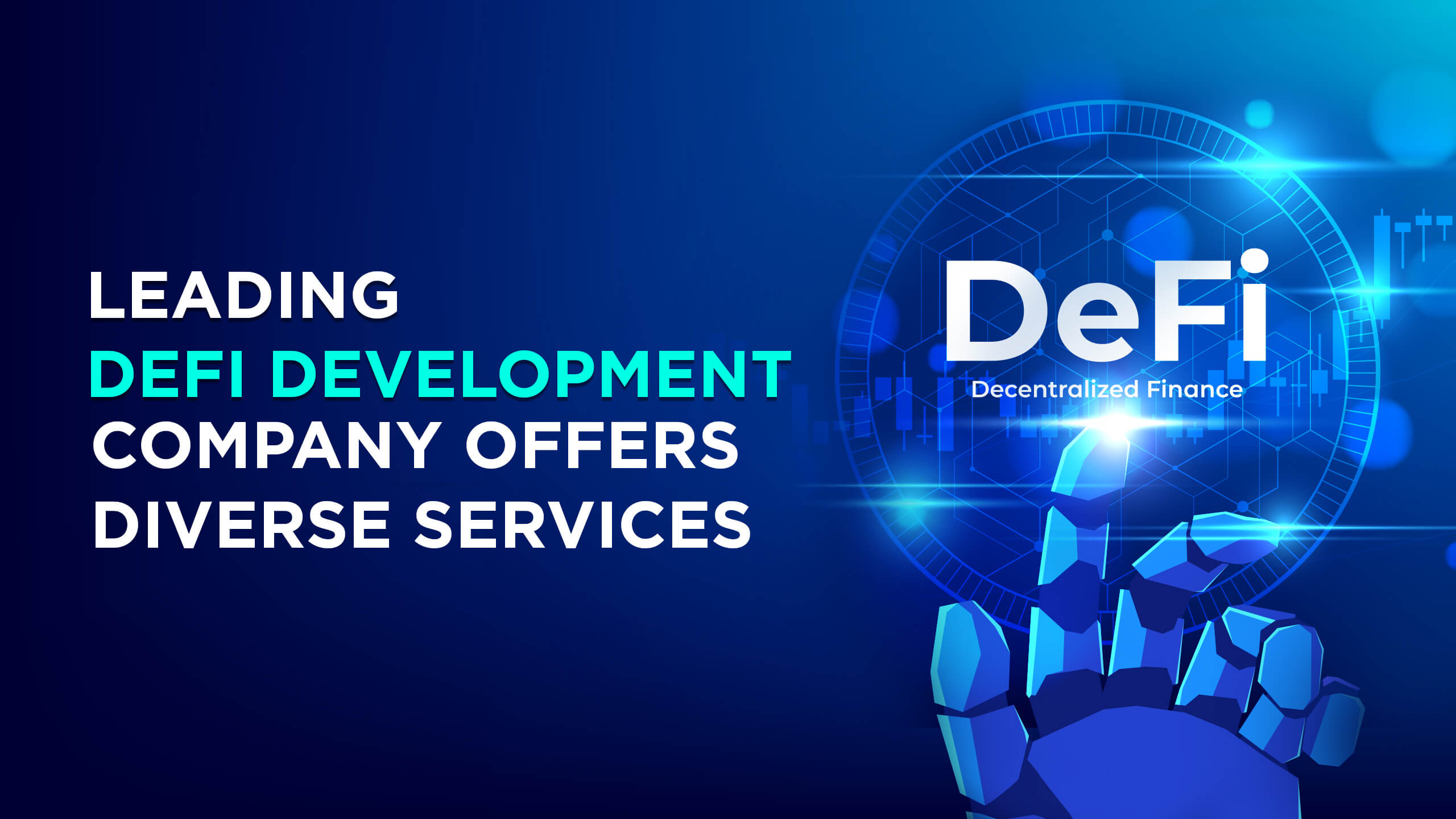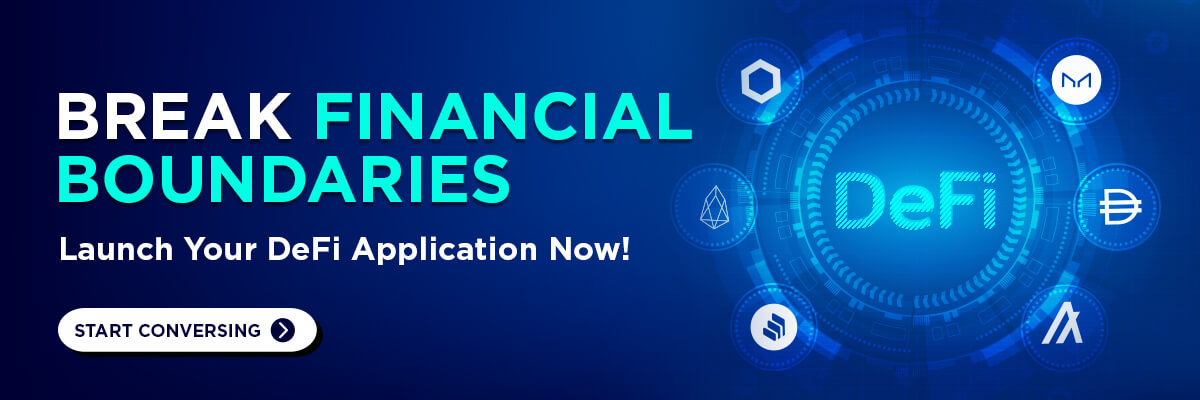A new financial system called decentralized finance (DeFi) is built on safely distributed ledgers, much like cryptocurrency. DeFi leverages developments in software, hardware, connectivity, security protocols, and peer-to-peer financial networks. Banks and other financial service providers are eliminated by this approach. Building platforms that provide services like lending, borrowing, and trading without the need for middlemen is the main emphasis of a DeFi Development company.
These businesses use smart contracts to automate processes while maintaining security and openness. With the DeFi method, custody of cryptocurrency assets is made possible by the control that individual traders have over their private cryptographic encryption passwords. Within the DeFi architecture, smart contracts, which are frequently supported on blockchains based on Ethereum, allow financial transactions.
Highlighting the Multiple Offerings of a DeFi Development Company
To handle digital assets from cross-border transactions, DeFi Development Services modernizes the banking sector. A leading DeFi development company assists in converting conventional financial services into decentralized finance applications that are fair, risk-free, and encrypted.
-
Smart Contract Development
Smart contracts are self-loading contract templates that undertake operations or perform actions as soon as certain conditions are triggered. They are very important in the development of DeFi apps as they facilitate smart contract functioning and operations with assets based strictly on certain conditions provided. Sometimes, those smart contracts are created and deployed to the blockchain by a DeFi Development company, which may ensure enough protection, elevated velocity, and a shortage of defects.
-
Decentralized Exchanges (DEXs)
DEX is, in general, the sort of trade that makes it less difficult for consumers and sellers to transact digital forex immediately. Since a decentralized finance development company is such a platform, it is easily accessible, secure, and functional. These platforms apply the principles of smart contracts and use them to pool up buyers and sellers, perform transactions, and maintain the order book. Power is decentralized, which means it lies with the users, implying that the decentralized ones are more secure than the centralized ones.
-
Tokenization Services
Tokenization is an action where a real-world asset is digitized to make a token that has the potential to be sold on a blockchain. For instance, a DeFi development company enhances tokenization offers through which corporations can generate tokens that represent tangible assets such as real estate and commodities. In addition, it helps bring such assets into the market in a more efficient way, and it also allows people to invest in such assets in small amounts.
-
DeFi Wallet Development
The goal of developing DeFi wallets is to provide decentralized financial wallets that are best suited for handling different kinds of digital assets, such as DeFi tokens and cryptocurrencies. Important components include user-friendly interfaces for increased accessibility and acceptance within the decentralized finance development ecosystem, interaction with DeFi protocols for smooth asset management, and security features like multi-signature authentication.
-
DeFi Lending/ Borrowing Platform Development
Establish a decentralized sharing network where users may borrow cryptocurrencies by pledging collateral like an NFT. Interest is charged by lenders, and a smart contract controls the deal. The stability of lending systems depends on efficient collateral management. To reduce risk for lenders and borrowers, decentralized finance development businesses have strong procedures in place for collateral appraisal, liquidation, and maintenance.
-
DeFi Staking platform development
The process of preserving cryptocurrency to enable transactions with the aid of Blockchain networks is known as DeFi staking platform development. You will get rewards on the Exchange platform for retaining the cryptocurrency and bolstering the blockchain network. Interest is another term for the accumulation of rewards.
With DeFi Staking, managing coins and cryptocurrencies allows you to generate passive income. Additionally, as the value of the cryptocurrency coin increases, you may be rewarded with tokens or earn additional interest.
-
DeFi Yield Farming Development Services
A technique to profit from digital currency ownership is called DeFi Yield farming, often known as liquidity mining. Simply put, it entails safeguarding cryptocurrency and receiving rewards. DeFi Yield Farming is the most profitable method of allowing cryptocurrency in the DeFi market. A decentralized finance development company creates yield farming systems with attractive incentives to entice users to contribute cash. This promotes user engagement and platform expansion.
-
DeFi DApps Development
DeFi DApps Development refers to the implementation of decentralized finance solutions into decentralized applications. This type of DApp, commonly known as DeFi DApp, can perform any economic transaction in a decentralized ecosystem. Moreover, it establishes a sufficiently robust rationale for DeFi as well as decentralized finance protocols. It is a distributed Fintech decentralized system that eliminates the role of the middleman as it enables the execution of several financial transactions, including lending, borrowing, and trading, among other services.
-
DeFi Insurance System Development
DeFi Insurance Platform is one of the greatest ideas within the decentralized Finance Environment, as it can act as protection for the DeFi marketplace. Since human beings invested in cryptocurrencies have lost their money through fraud and hacking within the last couple of years, many insurance companies have entered the DeFi market to defend the investments of investors. Insurance policies within the DeFi space help mitigate risks that affect the crypto enterprise.
Advantages of DeFi Development Services
DeFi is a new concept disrupting the financial industry by providing innovative solutions that eliminate third parties and enhance access to financial services. Now, let us discuss several significant advantages of cooperation with a decentralized finance development company.
-
Enhanced Security and Privacy
A public blockchain records all DeFi transactions. As a result, there is a high level of openness and security. Furthermore, the use of pseudonyms is highly regarded and is a potential means of safeguarding customers’ privacy.
-
Reduced Costs
Decentralized finance development eliminates traditional obstacles like bank accounts and credit ratings and offers financial services to anybody with an internet connection. The DeFi network eliminates the need for middlemen, which significantly lowers both the total cost of financial transactions and the middlemen’s fees.
-
Cross-Border Business
Decentralized Finances are the direct entities that may conduct commerce without any obstacles across national boundaries. This is directly related to moving cryptocurrency trading to a global platform and fostering better financial standing.
-
Availability
Anyone may use DeFi applications anywhere in the globe without the assistance of middlemen like banks or other financial organisations. This implies that those who had trouble accessing traditional banking services may now use financial services that were out of reach for them in the past.
-
Possibility for Innovation
There are legitimate opportunities to develop and provide DeFi services and goods in the DeFi ecosystem. DeFi is an open protocol that holds great potential for fostering the creation of new financial solutions. DeFi gains more importance as it supports Ethereum and enables innovators to create fresh decentralized financial apps.
Conclusion
Businesses can explore the use of cutting-edge technology for safe, open, and transparent financial solutions by collaborating with a Web 3.0 India – A leading DeFi development company. These businesses provide all-inclusive services that promote efficiency and innovation in the decentralized financial sector, from cross-chain interoperability to the creation of smart contracts.





